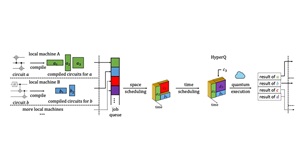Columbia Engineering Researchers Develop Cloud-Fashion Virtualization for Quantum Computing
Researchers at Columbia Engineering have unveiled HyperQ, a system that brings cloud-style virtualization to quantum computing, permitting a number of customers to share a single quantum processor concurrently. It is a milestone that might reshape how quantum sources are accessed, scheduled, and scaled.
Not like classical computer systems, which course of bits as 0s or 1s, quantum computer systems use qubits — items that may exist in a number of states without delay because of quantum phenomena like superposition and entanglement. This enables quantum machines to discover huge answer areas in parallel, making them uniquely suited to issues which can be computationally intractable for conventional programs.
The potential purposes are staggering: simulating molecular interactions for drug growth, optimizing logistics and provide chains, modeling monetary programs, and even cracking encryption protocols. However quantum {hardware} is pricey, fragile, and notoriously tough to scale. That is why breakthroughs like HyperQ matter — not only for rushing up analysis, however for making quantum computing extra accessible, environment friendly, and prepared for real-world deployment.
Breaking the Quantum Bottleneck
Quantum computer systems have historically operated below a extreme constraint: they might solely run one program at a time. This exclusivity meant that even minor duties monopolized million-dollar machines, leaving researchers caught in lengthy queues whereas a lot of the {hardware} sat idle. Columbia Engineering’s HyperQ system modifications that paradigm by introducing virtualization to quantum computing — an idea lengthy confirmed in classical cloud infrastructure.
What Is HyperQ?
HyperQ is a software program hypervisor that permits a number of customers to share a single quantum pc concurrently. It does this by creating remoted quantum digital machines (qVMs), every able to working its personal quantum program independently. As Jason Nieh, professor of pc science at Columbia Engineering, put it: HyperQ brings cloud-style virtualization to quantum computing. It lets a single machine run a number of packages without delay — no interference, no ready in line
.
How It Works
The system dynamically allocates quantum sources and schedules jobs primarily based on every program’s wants. A central scheduler — described by researchers as working like a grasp Tetris participant
— packs a number of qVMs onto totally different areas of the quantum chip, making certain optimum efficiency with out cross-interference.
| Part | Operate |
|---|---|
| Hypervisor | Divides quantum {hardware} into remoted qVMs |
| Scheduler | Allocates chip areas and balances workloads |
| qVMs | Run impartial quantum packages concurrently |
Actual-World Testing and Outcomes
HyperQ was examined on IBM’s largest quantum computer systems by way of the IBM Quantum cloud. Particularly, it was validated on IBM’s Brisbane quantum pc, a 127-qubit system primarily based on the Eagle chipset. Not like earlier multiplexing efforts that required specialised compilers and pre-coordinated workloads, HyperQ works dynamically with current quantum programming instruments. As lead writer Runzhou Tao defined, Our method works dynamically with current quantum programming instruments, which is much extra versatile and sensible for real-world use
.




